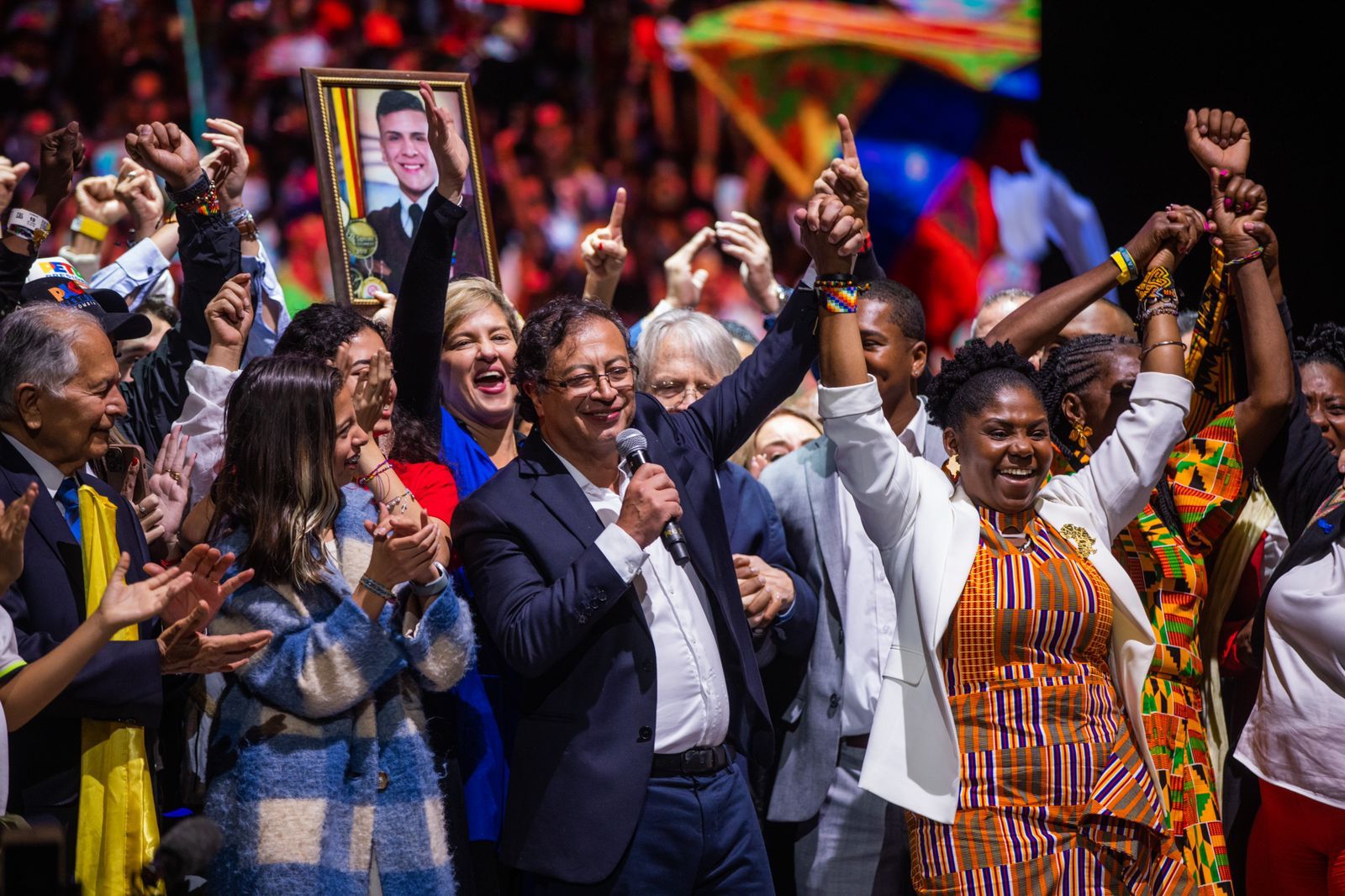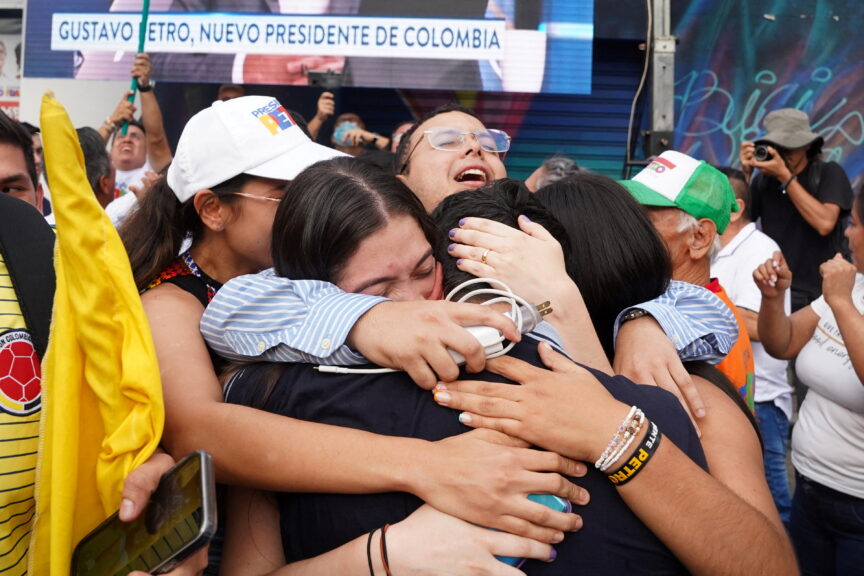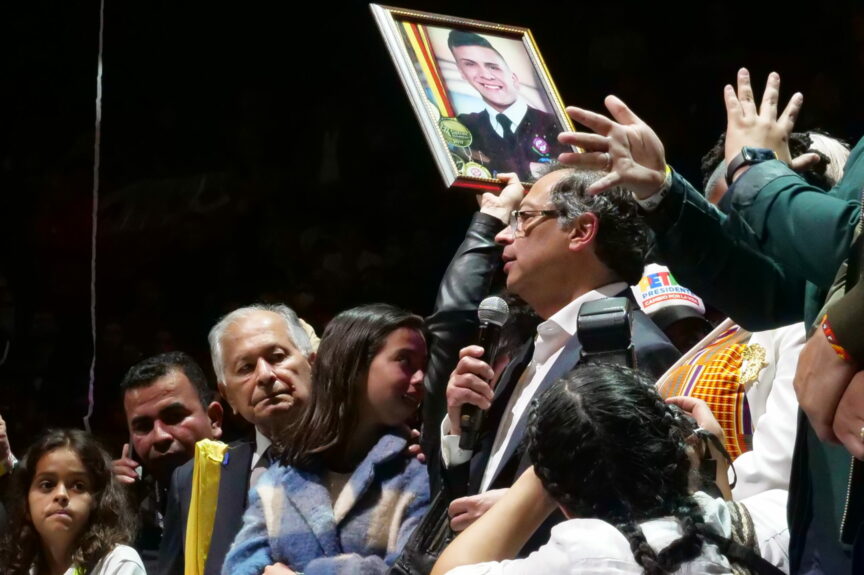Colombia’s First Leftist President Won Despite Everything the Establishment Threw at Him

Two days before Colombia’s election, activist Erika Prieto’s phone started to ring incessantly as we spoke in a quiet cafe in downtown Bogotá. We paused as she scrambled to respond to an influx of texts and voice notes; one of her friends was being arrested, but the lawyer she had contacted for help was being harassed by the police too.
Last week, dozens of young people – Prieto had counted at least 47 by Saturday night – were arrested across Colombia. While all were charged with crimes relating to last year’s mass protests against inequality and police brutality, Colombia’s chief of police said in a statement that the arrests were actually made in response to a “dark web” plot to “ignore the electoral results” and “generate acts of violence” in the event of a rightwing victory. No evidence was provided for the alleged plot, which Alirio Uribe Muñoz, a Bogotá senator, described as “totally false”.
Muñoz accused the police and prosecutor’s office of “trying to spread fear to prevent people from voting”. If the claims were substantiated, he asked, then why charge people in relation to last year’s protests? The alleged offences, he added, didn’t even stand up to scrutiny: on appearing before a judge, most arrestees were freed immediately, many after just one night in custody.
But a rightwing victory didn’t come to pass. On Sunday night, Bogotá erupted in tears, fireworks, chants and dancing as Colombia elected its first ever leftist president. Heading up Pacto Historico – a coalition of progressive parties – former Bogotá mayor Gustavo Petro beat rightwing populist Rodolfo Hernández with 50.5% of the vote to 47.3%.
While some Colombians were so motivated to vote for Petro and his Black, feminist vice president Francia Márquez that they travelled for two days by boat, few expected such a decisive win. Although the two candidates were polling nearly neck and neck, many were quietly preparing for a Hernández victory, as the end of the campaign saw allegations of fraud and voter suppression, alongside smears, death threats and assassination attempts from the outset. Ultimately, however, Petro and Márquez declared a resounding victory soon after polls closed in the second and final round of voting.
Promising to govern from the periphery, not just the city, listening to the “silent majority of peasants, indigenous people, women and youth”, in his victory speech Petro also attempted to placate his detractors, telling a jubilant arena of indigenous activists, sobbing teenagers, campaigners and the press that he would prioritise “peace, respect and dialogue”. Márquez told the crowd: “After 200 years we have achieved a government of the people. A government of the workers, of the nobodies. Now we will live with dignity.”

Despite the triumphant atmosphere, Petro and Márquez alluded in their speeches to the dangers of being on the left in Colombia. A huge number of progressive candidates have been assassinated in the country over the past 80 years, and many didn’t believe the elite, which has consistently held power throughout most of Colombian history, would allow a leftist to win.
In May, political figures and organisations from 20 countries signed an open letter condemning the murders of trade unionists, indigenous and Afro-Colombian representatives, peasant movement organisers and environmentalists aimed at “intimidat[ing] and eliminat[ing] Colombia’s popular movements”.
Muñoz said the sheer scale of the violence had been a major impediment to the campaign. “More than 90 social leaders have been assassinated this year,” he told Novara Media. “Many members of Pacto Historico have received threats from paramilitary groups and we received information about a plan to kill Gustavo Petro.”
Consequently, during the first round in May, Petro – who survived an assassination attempt in which his car was shot at in 2018 – chose to avoid public events and gave his closing speech from behind a giant metal shield. He also suspended campaigning in part of the country after it was revealed a paramilitary group had paid the equivalent of half a million pounds to have him killed.
But, desperate to win in the second round, he took far greater risks, travelling the country to meet ordinary people on their sugar farms and coffee plantations and in their restaurants and houses.
Márquez, meanwhile, who also survived an assassination attempt involving grenades and gunfire in 2019, was ushered off stage by bodyguards after green lasers were beamed onto her body as she addressed a large crowd last month.
Durante la conmemoración del #DiaDeLaAfrocolombianidad, quisieron intimidarme apuntándome con un láser desde un edificio cercano. ¡No nos callarán! Nuestra lucha es y siempre ha sido contra todos los tipos de violencia que pretenden sembrarnos miedo.
¡La paz vencerá! pic.twitter.com/1KIqIiD0jD— Francia Márquez Mina (@FranciaMarquezM) May 22, 2022
On Friday night, Cristian Durango, an activist in his twenties with bleached hair and a gold tooth, was distributing Pacto Historico flyers on a hectic city street. Released from police custody the day before – just 24 hours after he voluntarily presented himself to the prosecutor’s office – he didn’t seem fazed by his arrest. “They didn’t even try to get me jailed awaiting trial,” he said. “It was obvious the prosecutor was just tired of these cases.”
Describing the arrests of activists as a “typical” attempt to use “psychological terror against social movements”, Durango said that actually, the police were just making people angry. “All they’re going to do is provoke more indignation. They’re giving people more reasons to take to the street or to campaign for Petro.”
Indeed, if arresting activists was aimed at suppressing the left vote, it seems the police and state sorely misjudged things – not least because Colombia’s activist youth has withstood far worse than a flurry of arrests in recent history.
During his victory speech on Sunday night, Petro briefly gave the floor to Yenny Alejandra Medina, mother of Dilan Cruz, an 18-year-old who was murdered in 2019 when riot police shot him in the head as he tried to run away from a protest.
Cruz’s murder was a flashpoint, launching the “first line” – activists who armed themselves with helmets and shields to protect the protests which flared up again in 2020 and 2021 when Iván Duque’s rightwing government attempted to increase taxes in the midst of Covid restrictions.
More than 40 people were killed in 2021. Around 80 people lost an eye at the hands of riot cops. Thousands were arrested. A first line protester was found dead in the southwest city of Cali, Prieto recalled, chopped up and put in plastic bags. Another was raped and murdered in police custody, while a group of activists was left to burn to death in a police station. Prieto said these are just a few examples among many: “Perhaps my brain is protecting itself by forgetting others.”
Having lived through these protests, it’s clear to Prieto, Durango and others that the best way forward is to support a left government that has promised to dismantle the riot police and support social movements. After 14 years as a human rights defender, Prieto joined Pacto Historico to work on preventing election fraud. Petro’s victory, she said, means she will likely remain alive and free, when otherwise she might not.

Senator José Alberto Tejada was a journalist during the protests in 2021, becoming famous for his prolific coverage of the front line. He stood for election this year at the behest of young protesters, feeling “a deep political responsibility to try to help to build some kind of democracy in Colombia,” he told Novara Media.
Tejada has been appalled by the way “corporate media” has smeared Petro during the campaign, exaggerating or inventing negative stories while almost ignoring the fact that Hernández is currently facing a criminal trial on corruption charges.
Muñoz accused the current government of lacking neutrality too. “Duque made more than 40 public speeches in which he criticised or even directly confronted Petro. The same thing was done by the commander of the army and several public servants and authorities,” he said. This could amount to a violation of the constitution, he argued, because a president isn’t supposed to act directly in a campaign.
Both senators feared electoral fraud ahead of the vote, citing discrepancies in the previous round and the fact that international observers weren’t allowed to inspect the code used in vote count software.
Tejada believes the scrutiny of the international community is crucial, and election observers and the international press likely made it harder to cheat. But people must remain vigilant, he said – at least until Petro actually takes office in August.
“I’m not exaggerating – the people in the government right now, these aren’t politicians. They’re actually a criminal mafia dressed as politicians,” he said of the outgoing government.
Charlotte England is a director and deputy head of articles at Novara Media.


